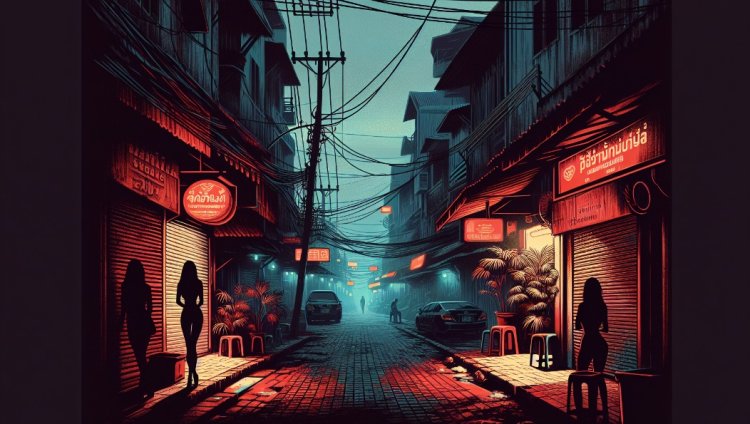Exploring the Dark Side of Pattaya's Red-Light District: Sex Tourism and Child Exploitation
"Delve into the hidden truths of Pattaya's Red-Light District. Uncover the grim reality of sex tourism and child exploitation in this in-depth exploration of one of Thailand's infamous destinations."

Introduction
Pattaya, a city in Thailand, has long been known as a popular destination for sex tourism. With its red-light districts and countless sex workers, it has attracted visitors from all over the world seeking cheap and easy access to sex. However, the COVID-19 pandemic has had a significant impact on the sex tourism industry in Pattaya, causing it to shut down for nearly two years. Now, as the city reopens, the red-light district is back in business.
One long-time visitor to Pattaya is Wolfgang Rill, a 74-year-old man who describes himself as a "Pattaya lover" rather than a sex tourist. He has been coming to Pattaya for decades and has even written books about his experiences with Thai women. Despite the controversial nature of his visits, Wolfgang is open about his fascination with the city and the relationships he forms with the women he meets.
My fascination with Pattaya stems from a curiosity about the dark side of the city. The intricate dynamics of the sex tourism industry, the effects it has on both the workers and the tourists, and the moral issues it raises intrigue me. In this blog, we will delve into the world of Pattaya's red-light district, exploring the lives of sex workers, the challenges they face, and the efforts being made to combat child exploitation.
The Lives of Sex Workers in Pattaya
In the bustling city of Pattaya, thousands of sex workers make a living in the red-light district. One such worker is Aom, a young woman who turned to sex work after becoming pregnant and having a German man abandon her. Aom works as a prostitute to support herself and her family back in her village. She dreams of leaving the job, but the lack of opportunities in her village makes it difficult for her to find alternative work.
Sex workers in Pattaya face numerous challenges and motivations. Some are driven by financial necessity, while others are drawn to the fast money and independence that the job offers. Many come from impoverished backgrounds and see sex work as a way to provide for themselves and their families. However, the illegality of the profession in Thailand poses significant obstacles. Most sex workers lack health insurance and are unable to access government aid programs. The COVID-19 pandemic and subsequent lockdown have further exacerbated their already vulnerable situation, as they were barred from receiving any form of assistance.
While there is a dark side to the red-light industry in Pattaya, with cases of child exploitation and the involvement of organised criminal networks, efforts are being made to combat these issues. Child protection organisations are actively working to identify and rescue underage girls who are forced into prostitution. They engage in outreach programs to educate sex workers and tourists about the importance of reporting any suspicious activities involving children. The police are also taking action, with recent arrests of individuals involved in child abuse and human trafficking.
It is essential to remember that not all sex tourists in Pattaya are engaging in illegal or exploitative activities. Some genuinely seek companionship and enjoy the company of Thai women. However, it is crucial to understand the power dynamics and ethical questions that arise in these relationships. It is a business transaction, and the exchange of money for companionship and sex is at the core of the interaction.
In conclusion, the lives of sex workers in Pattaya are complex and multifaceted. While some women find empowerment and financial stability in the industry, others face challenging circumstances and exploitation. The COVID-19 pandemic has further exposed the vulnerabilities of these workers. Efforts to address child exploitation and improve the overall well-being of sex workers are ongoing, but there is still much work to be done.
The Return of German Paedophiles to Pattaya
As Pattaya's red-light district reopens after the COVID-19 pandemic, there are concerning observations of the return of German paedophiles to the city. Despite the official denial of prostitution in Pattaya, the reality is that many of the women working in bars are engaged in sex work. Aom, a sex worker in Pattaya, tells the story of how a German man abandoned her after she became pregnant, forcing her to rely on sex work to support her and her family.
The link between sex tourism and child exploitation is a disturbing one. While efforts are being made to combat child exploitation in Pattaya, child protection organisations are finding it challenging to address all instances of underage prostitution. Some children are sent out to sell chewing gum to tourists and end up being lured into the red-light district. These vulnerable children become easy targets for paedophiles and face unimaginable abuse.
In an interview with a child protection organisation in Pattaya, it became evident that there is still a significant problem with child exploitation in the city. Despite claims that child prostitution is a problem of the past, it remains an ongoing issue. Western travel companies, including Germany's largest tour operator, TUI, have unwittingly played a role in promoting red-light hotels in Pattaya, perpetuating the demand for exploitative activities.
It is essential to address the role of travel companies in promoting red-light hotels and the responsibility they have in ensuring ethical practices. The focus should be on protecting vulnerable children and preventing their exploitation. Efforts must be made to educate tourists about the importance of reporting suspicious activities involving children and to create awareness of the consequences of participating in the sex tourism industry.
Efforts to Combat Child Exploitation
In the bustling city of Pattaya, thousands of sex workers make a living in the red-light district. One such worker is Aom, a young woman who turned to sex work after becoming pregnant and having a German man abandon her. Aom works as a prostitute to support herself and her family back in her village. She dreams of leaving the job, but the lack of opportunities in her village makes it difficult for her to find alternative work.
Sex workers in Pattaya face numerous challenges and motivations. Some are driven by financial necessity, while others are drawn to the fast money and independence that the job offers. Many come from impoverished backgrounds and see sex work as a way to provide for themselves and their families. However, the illegality of the profession in Thailand poses significant obstacles. Most sex workers lack health insurance and are unable to access government aid programmes. The COVID-19 pandemic and subsequent lockdown have further exacerbated their already vulnerable situation, as they were barred from receiving any form of assistance.
While there is a dark side to the red-light industry in Pattaya, with cases of child exploitation and the involvement of organised criminal networks, efforts are being made to combat these issues. Child protection organisations are actively working to identify and rescue underage girls who are forced into prostitution. They engage in outreach programs to educate sex workers and tourists about the importance of reporting any suspicious activities involving children. The police are also taking action, with recent arrests of individuals involved in child abuse and human trafficking.
Interview with Thailand's Deputy Police Chief on the fight against child abuse
The Deputy Police Chief of Thailand has expressed concerns about child abuse, stating that it is a significant issue in Thailand and across Southeast Asia. He acknowledges that the problem is worsening, with children being abused at younger ages and experiencing more severe forms of violence. The police are facing challenges in their investigative work as offenders are using new technologies to hide their tracks. However, he assures us that the police are committed to addressing child exploitation and holding perpetrators accountable.
Overview of the work of the T-I-C-A-C unit in combating online child abuse
The T-I-C-A-C unit in Thailand focuses on combating online child abuse, which has seen a significant increase during the COVID-19 pandemic. The unit is dedicated to identifying and rescuing children who are forced into online prostitution and pornography. They work tirelessly to track down offenders and bring them to justice. The unit relies on advanced technologies to uncover and investigate cases of online child abuse.
Challenges faced by law enforcement in addressing child exploitation
Law enforcement agencies face several challenges in addressing child exploitation in Pattaya and other areas. One of the main difficulties is the covert nature of these crimes, with offenders constantly adapting their methods to evade detection. Additionally, the involvement of organised criminal networks makes it more challenging to dismantle these operations. The lack of resources and awareness among the public also hinders efforts to combat child exploitation.
A case study of the Cobra Bar and the arrest of a German suspect
A recent case that highlights the issue of child exploitation is the Cobra Bar in Pattaya. This bar was found to employ underage prostitutes, and a German suspect was arrested on charges of child abuse. The bar was shut down, and the owner is being investigated for human trafficking. The case serves as a reminder of the ongoing presence of child prostitution in Pattaya and the need for continued efforts to protect vulnerable children.
In conclusion, child exploitation remains a significant concern in Pattaya's red-light district. While efforts are being made to combat this issue, there are still challenges to overcome. Law enforcement agencies, child protection organisations, and the public must work together to raise awareness, report suspicious activities, and ensure the safety and well-being of children in the area.
An Interview with the German Suspect
In a shocking turn of events, we were able to conduct an interview with the German suspect, who fled from Thailand to Germany after being accused of child abuse. The suspect agreed to speak with us anonymously and share his perspective on the allegations against him.
Discussion of the Allegations
The suspect admitted that the accusations against him were true. He acknowledged that he had visited a bar in Pattaya where underage girls were working and had taken one of them back to his place to engage in sexual activities. He expressed remorse for his actions and recognised the gravity of his wrongdoing.
Examination of the Role of German Authorities
When asked about the lack of investigation by German authorities, the suspect claimed that he had paid substantial bribes to facilitate his escape from Thailand. He alleged that he had been able to leave the country under the supervision of Thai authorities, with documents signed by a prosecutor, a judge, and a police officer. He expressed frustration at the perceived injustice and lack of transparency in the process.
Addressing the Issues of Exploitation and Awareness
This interview highlights the ongoing issues of exploitation and awareness surrounding child abuse in Pattaya's red-light district. It raises important questions about the responsibilities of travel companies, such as Germany's largest tour operator, TUI, in promoting red-light hotels and contributing to the demand for exploitative activities.
Efforts must be made to educate tourists about the importance of reporting suspicious activities involving children and to create awareness of the consequences of participating in the sex tourism industry. It is crucial to address the role of travel companies in ensuring ethical practices and protecting vulnerable children from exploitation.
Responsibility of the Travel Industry
The investigation into Pattaya's red-light district and the issue of child exploitation has raised important questions about the responsibility of the travel industry, particularly travel companies like TUI. These companies must address their role in promoting red-light hotels and contributing to the demand for exploitative activities.
TUI's Response to the Investigation
Upon learning about the conditions within the hotels in Pattaya's red-light district, TUI has taken immediate action to remove these hotels from their programme. They have also advised the databases they work with to exclude these hotels and verify that they meet ECPAT criteria. TUI's swift response is an encouraging sign of their commitment to responsible tourism.
The importance of responsible marketing by travel companies
Travel companies have a responsibility to ensure that their marketing aligns with ethical practices and does not contribute to the exploitation of vulnerable individuals, especially children. By promoting hotels in red-light districts, travel companies inadvertently perpetuate the demand for exploitative activities. It is crucial for these companies to thoroughly vet the hotels they promote and prioritise the well-being and safety of their customers.
Role of Organisations Like ECPAT in Addressing Child Exploitation
Organisations like ECPAT (End Child Prostitution, Child Pornography, and Trafficking of Children for Sexual Purposes) play a crucial role in addressing child exploitation. They work tirelessly to raise awareness, advocate for policy changes, and support victims of child exploitation. Travel companies should collaborate with organisations like ECPAT to develop responsible tourism practices and ensure the protection of vulnerable children.
The need for increased vigilance and accountability
The fight against child exploitation requires increased vigilance and accountability from all stakeholders, including travel companies, law enforcement agencies, and the public. It is essential for travel companies to actively monitor and address any reports or suspicions of child exploitation within their destinations. They should also educate tourists about the importance of reporting any suspicious activities involving children and create awareness of the consequences of participating in the sex tourism industry.
In conclusion, the responsibility of the travel industry in addressing child exploitation cannot be overstated. Travel companies have a crucial role to play in promoting responsible tourism, protecting vulnerable children, and supporting initiatives that combat child exploitation. By prioritising ethical practices and collaborating with organisations like ECPAT, the travel industry can contribute to the eradication of child exploitation in destinations like Pattaya.
Conclusion: A Call for Change
In conclusion, this blog has explored the dark side of Pattaya's red-light district, shedding light on the issues of sex tourism and child exploitation. We have delved into the lives of sex workers in Pattaya, examined the return of German paedophiles to the city, and discussed the efforts being made to combat child exploitation.
The lives of sex workers in Pattaya are complex and multifaceted. While some women find empowerment and financial stability in the industry, others face challenging circumstances and exploitation. The COVID-19 pandemic has further exposed the vulnerabilities of these workers, as they were barred from receiving any form of assistance.
Efforts to combat child exploitation are ongoing, with child protection organisations actively working to identify and rescue underage girls who are forced into prostitution. They engage in outreach programs to educate sex workers and tourists about the importance of reporting any suspicious activities involving children. The police are also taking action, with recent arrests of individuals involved in child abuse and human trafficking.
However, it is crucial to address the root causes of child exploitation and to raise awareness about the consequences of participating in the sex tourism industry. Travel companies, such as Germany's largest tour operator, TUI, have a responsibility to ensure that their marketing aligns with ethical practices and does not contribute to the exploitation of vulnerable individuals, especially children.
Addressing child exploitation requires increased vigilance and accountability from all stakeholders, including travel companies, law enforcement agencies, and the public. It is essential to protect vulnerable children, enforce strict laws against offenders, and support initiatives that combat child exploitation.
In conclusion, the state of Pattaya's red-light district is a complex and troubling issue. We must continue to shine a light on this dark side of tourism and work towards creating a safer and more ethical environment for all individuals involved.
FAQ
What is the current state of the sex tourism industry in Pattaya?
The COVID-19 pandemic had a significant impact on the sex tourism industry in Pattaya, forcing the red-light district to close for almost two years. However, as the city reopens, the industry is slowly returning to business.
What are the challenges faced by sex workers in the city?
Sex workers in Pattaya face numerous challenges, including financial instability, a lack of health insurance, and limited access to government aid programmes. They also often lack legal protections and face stigma and discrimination.
How are the authorities combating child exploitation in Pattaya?
Authorities in Pattaya are taking action to combat child exploitation. Child protection organisations work to identify and rescue underage girls forced into prostitution. They also engage in outreach programmes to educate sex workers and tourists about the importance of reporting suspicious activities involving children. The police have made recent arrests of individuals involved in child abuse and human trafficking.
What can individuals and travel companies do to address the issue?
Individuals and travel companies can play a crucial role in addressing the issue of child exploitation in Pattaya. They can educate themselves and others about the consequences of participating in the sex tourism industry and the importance of reporting suspicious activities involving children. Travel companies can also prioritise ethical practices and collaborate with organisations like ECPAT to ensure the protection of vulnerable children.
Is there hope for a better future for the children involved?
Efforts are being made to combat child exploitation in Pattaya, and there is hope for a better future for the children involved. Child protection organisations work tirelessly to rescue underage girls and provide them with support and resources. The increased vigilance and accountability of authorities, travel companies, and the public can contribute to the eradication of child exploitation and the creation of a safer environment for children in Pattaya.



 admin
admin 










